Djibril Cissé French pronunciation; born 12 August 1981 in Arles is a French professional association football player who plays as a striker for Panathinaikos. He is noted particularly for his speed and acceleration. Since 2005, he has held the title of Lord of the Manor of Frodsham. career at AC Arles in 1989 at the age of 8. After seven years at the club, he had a six-month spell at Nîmes Olympique before moving to Auxerre joining the club's youth system. Cissé spent two years in the system before graduating to the first team in 1998. Having had a move to Liverpool delayed once, he finally moved to the Merseyside based club in 2004, after playing for Auxerre for six seasons, scoring 90 goals in 166 appearances. During his time at Anfield, he played 83 games, scoring 26 times. Towards the end of his Liverpool career, he had a loan spell at Marseille scoring 15 goals in 25 appearances before the deal was made permanent. Cissé returned to the Premier League once more in 2008 with a loan spell at Sunderland, scoring 11 goals in 39 appearances. On 25 June 2009, he signed a four year contract with Greek side Panathinaikos, with a transfer fee of about €8 million.Contents1 Personal life2 Club career2.1 Auxerre2.2 Liverpool2.3 Marseille2.4 Sunderland2.5 Panathinaikos F.C.3 International career3.1 Youth career3.2 Senior career4 Career statistics4.1 Club4.2 International4.3 International Goals5 Honours5.1 Club5.2 International5.3 Individual6 References7 External linksPersonal lifHis father, Mangué Cissé was formerly a professional footballer and had captained his country before his parents moved from the Ivory Coast to France in 1974. Djibril was the seventh and last child of his family, after siblings Nma, Damaye, Abou, Fode, Seni, Hamed. After his move to Liverpool, Cissé purchased a house in the village of Frodsham, Cheshire, and in doing so gained the title of Lord of the Manor of Frodsham Son after buying the house, his decision to refuse the Cheshire Forest Hunt permission to hunt on his land received substantial press coverage. In June 2005, Djibril Cissé married Jude Littler, a College Lecturer from Anglesey. The wedding took place at Bodelwyddan Castle, with notable guests including Shaun Wright-Phillips and Cissé's French national teammates, Louis Saha and Sylvain Wiltord. got married in a tuxedo in the red of Liverpool. He and his wife, Jude, have three children. Djibril also has a daughter from a previous relationship, while Jude has a son Liam from a previous relationship.Cissé also had a cameo role in a French comedy movie titled Taxi 4, featuring in a high speed driving scene. On 1 April 2009, Cissé was arrested on suspicion of assaulting a woman outside a lap-dancing club in Newcastle, believed to be The Diamonds club in Grey Street. He was later released on police bail.Club careerAuxerreHaving started his career with Nîmes Olympique he then signed for AJ Auxerre at the age of 15. Playing for the youth team in 1999, Cissé won the Coupe Gambardella, the equivalent of the FA Youth Cup. But in his first two seasons as a senior with the South of France club, he made just three appearances scoring no goals. his first season as a regular in the 2000–01 season, he scored 8 goals in 25 games.His first honour in his senior Auxerre career came as they won the French Cup in May 2003 The French Cup win led to Auxerre playing in the French Champions Trophy, where they were defeated 2–1 by Olympique Lyonnais on 26 July 2003. Cissé was also the top scorer in the French Ligue 1 in the 2001–02 and 2003–04 seasons, and in his time there, he scored 70 goals in 128 league game before signing for Liverpool in a deal worth over £14 million. Liverpool had pursued Cissé for over a year, and it was an open secret that then Liverpool manager Gérard Houllier admired Cissé's qualities.LiverpoolAt Liverpool, Cissé scored 11 goals in 23 first-team games in all competitions for Liverpool in the 2004–05 season. He had only played 19 games for Liverpool when a freak accident occurred while playing against Blackburn Rovers on 30 October 2004. While Cissé and Blackburn's James McEveley were challenging for the ball, Cissé's boot got caught in the turf and his leg snapped. This resulted in a broken tibia and fibula, and physio Daryl Martin said "It could take six to nine months for a recovery and the absolute worst-case scenario is 18 months..." Cissé later revealed that had it not been for prompt attention from the trainers at the stadium, he would probably have lost the leg below the knee. He had pins inserted in the leg, and was expected to be out of action for the rest of the 2004–05 season.However, in an unexpected return, Cissé was able to come on as a substitute in the 75th minute of the second leg of Liverpool's Champions League quarter-final tie with Juventus, on 13 April 2005. He went on to score both Liverpool goals in their last Premiership match of the season, a 2–1 win over Aston Villa, and also converted a penalty in Liverpool's penalty shootout win over AC Milan in the 2005 Champions League final. During the 2005–06 season, Liverpool manager Rafael Benítez deployed Cissé on the right wing on numerous occasions. While his pace made him well suited to such a role, it was doubtful whether he would be happy to continue in this role rather than in his preferred position as striker.He scored two goals as Liverpool won the 2005 UEFA Super Cup. Cissé also scored the opening Liverpool goal in the 2006 FA Cup Final with a sliding shot past West Ham United keeper Shaka Hislop, Liverpool going on to win on penalties.marseilleFrom summer 2005, the media had linked Cissé with a move away from Anfield.Speculation intensified as the season went on due to his lack of starting appearances. On 2 July 2006, Cissé claimed on Sky Sports that Benitez was forcing him out of the club. In early June 2006, it was reported that a transfer to Olympique de Marseille had been agreed. The very same day Cissé broke his leg in a takle from Zheng Zhi during France's final warm up match against China on 7 June 2006. It was thought that even though a relatively quick recovery was expected,Cissé's transfer would be postponed until at least the January transfer window. However, the two teams agreed a loan deal in July 2006.Cissé made his return to training on 20 October 2006,nd scored his first goal for Olympique de Marseille on 22 December 2006 when they beat AS Saint-Étienne 2–1. With only four goals in 14 appearances by April, Cissé's performances were drawing such criticism that former player Jean-Pierre Papin urged Cissé's critics to be more patient while the striker recovered from his career-threatening injury. Despite the slow start, Cissé managed to score 4 goals in his final 7 league appearances to finish with 8 goals in 21 league appearances,helping Marseille to finish 2nd in the 2006–07 season and guarantee a Champions League place for the 2007–08 season.[34] On 12 May 2007, he scored 2 goals in the French Cup Final against Sochaux, although Marseille still lost the match 5–4 on penalties, after a 2–2 stalemate after extra time following a late equaliser by another Liverpool player on loan Anthony Le Tallec.On 7 July 2007, Marseille president Pape Diouf announced that the club had struck a deal with Liverpool to sign Cissé permanently, for an estimated fee of €8 million. But subsequently, Cissé was linked with a return to the English Premier League with Blackburn Rovers, Wigan Athletic, Tottenham Hotspur, Portsmouth and Bolton Wanderers said to be interested. Manchester City had their approach for Cissé rejected by Marseille boss, who said, "He is wanted, that is for sure, I myself have been approached by Manchester City (about Cissé) but I turned it down categorically". On 26 January 2008, Cissé scored a hat trick in Marseille's 6–1 win against Caen. Djibril Cisse
Djibril Cisse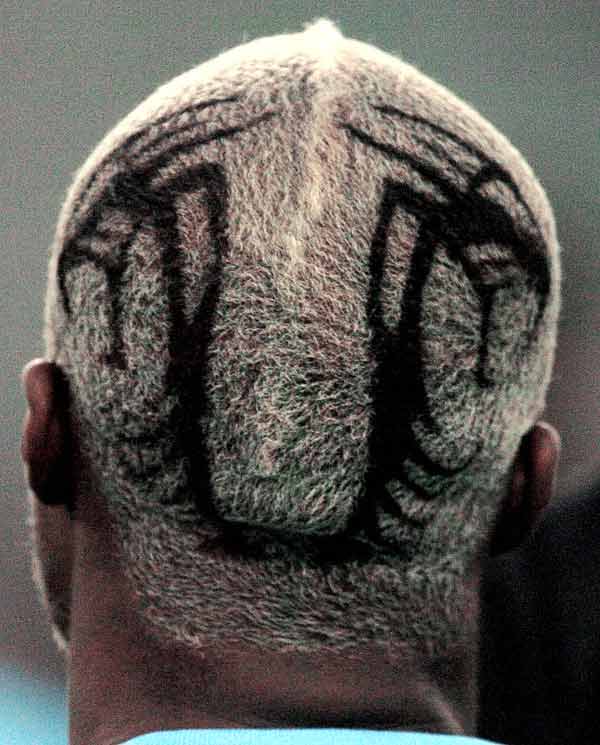 Djibril Cisse
Djibril Cisse Djibril Cisse
Djibril Cisse Djibril Cisse
Djibril Cisse Djibril Cisse
Djibril Cisse
 Djibril Cisse
Djibril Cisse Djibril Cisse
Djibril Cisse Djibril Cisse
Djibril Cisse
Ezequiel Iván Lavezzim born 3 May 1985, nicknamed "El Pocho", is an Argentine football striker who currently plays for Italian Serie A club Napoli and the Argentine national team.Contents 1 Club career1.1 Early career1.2 Genoa1.3 San Lorenzo1.4 Napoli2 International career3 Club statistics4 Titles5 References6 External linksClub careerEarly careerThe media, as they tend to do to many promising young Argentine players who appear in Italy, have been quick to dub Lavezzi the "New Maradona". Lavezzi himself, however, plays this down, instead comparing himself to another young Argentine player, Carlos Tévez. Despite this, his style very much follows the principles of Argentine Football Creole Style made famous by Maradona himself.As a youngster, Lavezzi had a very keen interest in football and supported his local side Rosario Central; he would later get their badge tattooed on his chest.From a very young age, the footballing talent of Lavezzi was recognised, as he played in the youth squads of Rosario Central. After being rejected in Boca Juniors. Lavezzi moved to the youth side of Estudiantes de Buenos Aires in 2003, where over one season, he played 39 games and scored 17 goals.GenoaKnown as el Pocho or the Chubby One, he was bought by Italian side Genoa in 2004 for €1 million, but was loaned out straight-away to Argentina side San Lorenzo. Here at the age of 19, he competed in the Apertura 2004 tournament scoring six goals in total over the course of the season; which saw him finish as 4th top scorer.Lavezzi's most notable contributions included a spectacular effort against River Plate at the El Monumental. He scored in the 69th minute to give San Lorenzo a famous victory and seriously damage River's title challenge. This gained him the nickname la Bestia "the Beast" from the Argentine media.Although it was planned for Lavezzi to return back to Genoa after a season on loan, there were problems: while Lavezzi was playing in Argentina, Genoa were involved in an alleged match-fixing scandal which saw them relegated down to Serie C1, the third level of Italian football. Due to financial constraints, the promising forward was sold to San Lorenzo for €1.2 million. LorenzoOn his return to San Lorenzo for the Apertura 2005 season, he managed to help the club up into the top half of the table, and with eight goals, he finished as the overall fourth top scorer. His last act as a San Lorenzo player was to help them to the Clausura 2007 title, beating out Boca Juniors by six points.NapoliNapoli had recently achieved promotion back to Serie A, after finishing as runners-up the previous season in Serie B. Looking to strengthen their squad for a return to the top level, Napoli signed Lavezzi on a five-year contract on 5 July 2007. The transfer deal was worth around €6 million and he was presented before the fans and given the #7 shirt for his first season.Lavezzi soon made an impact for the club by scoring a hat-trick in a 3–1 victory over Pisa in the Coppa Italia at the Stadio San Paolo; this was the first hat-trick by a Napoli player in 14 years.[7] The first league goal Lavezzi scored for Napoli came during a 5–0 victory against Udinese on 2 September 2007. After the match, he was described in reports as "inspirational," with the media proclaiming, "Napoli's star is born." Neapolitan club hadn't won a league match by such a large margin since 1988, when Diego Maradona was at the club.He completed the 2007–08 season with eight goals in 35 games. He quickly became a focal point of the fans' affection with his skills. In the 2008–09 season, he scored seven goals in 30 games.In the 2009/2010 he scored 8 goals in 30 games but he had not played around 10 games because of injuries.International careerLavezzi made his international debut for the Argentine national team team against Chile on 18 April 2007. He was chosen to represent Argentina at the 2008 Olympics. He scored two goals, one against Australia on 10 August 2008, and a penalty against Serbia on 13 August 2008. Lavezzi also appeared in the final minutes of extra time against Nigeria, in a game Argentina won 1–0.Lavezzi's club form was not enough to see him included in Diego Maradona's 2010 FIFA World Cup squad. ezequiel lavezzi
ezequiel lavezzi ezequiel lavezzi
ezequiel lavezzi
 ezequiel lavezzi
ezequiel lavezzi ezequiel lavezzi
ezequiel lavezzi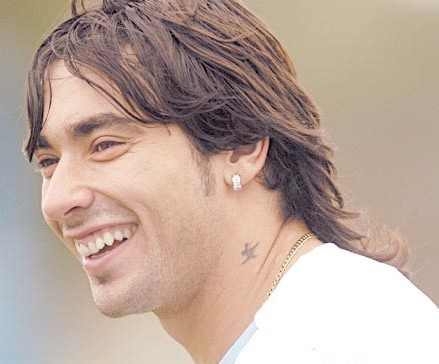 ezequiel lavezzi
ezequiel lavezzi ezequiel lavezzi
ezequiel lavezzi ezequiel lavezzi
ezequiel lavezzi ezequiel lavezzi
ezequiel lavezzi ezequiel lavezzi
ezequiel lavezzi ezequiel lavezzi
ezequiel lavezzi ezequiel lavezzi
ezequiel lavezzi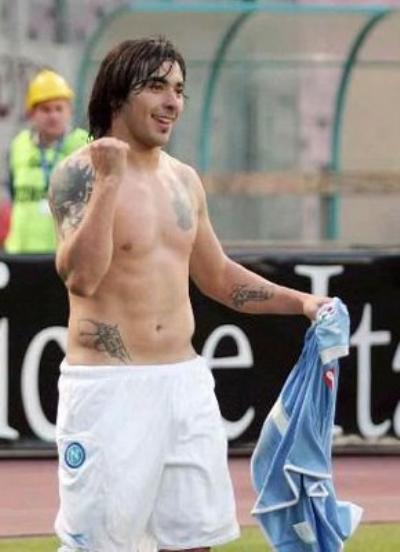 ezequiel lavezzi
ezequiel lavezzi ezequiel lavezzi
ezequiel lavezzi
Javier Hernández Balcázar pronunciation: xaˈβjer erˈnandes; born 1 June 1988, also known by his nickname "Chicharito"(Spanish: little pea), is a Mexican footballer who plays as a forward for Manchester United, being the first Mexican to do so. He previously played for Mexican club Guadalajara. He made his début for the Mexico national football team in September 2009 in a match against Colombia and represented them at the 2010 FIFA World Cup scoring two goals. He is the son of Javier Hernández Gutiérrez and the grandson of Tomás Balcázar.Contents 1 Early life2 Club career2.1 C.D. Guadalajara2.2 Manchester United3 International career3.1 Mexico U-203.2 Mexico national football team3.3 International goals4 Style of play5 Career statistics6 Honours6.1 Club6.2 Individual7 Personal life7.1 Nickname8 References9 External linksEarly lifeHernández was born in Guadalajara, Jalisco, on 1 June 1988. He first played in a recreation league when he was seven years old. His father, Javier Hernández Gutiérrez, himself a previous Mexican international striker, said he never thought his son would actually make it as a professional. Hernández joined C.D. Guadalajara at the age of nine and signed his first professional contract when he was 15. He was set to play in the 2005 FIFA U-17 World Championship, but an injury sidelined him from the team that ultimately won the championship.Club careerC.D. GuadalajaraHernández began playing with Chivas' lower division team, Chivas Coras in Tepic, Nayarit in the 2005–06 season. He made his debut for Chivas in the 2006 Apertura in a win over Necaxa at Estadio Jalisco. With the score at 3–0, Hernández came on as a substitute for Omar Bravo in the 82nd minute, before scoring the fourth goal of the game five minutes later. It was his only goal in seven appearances in 2006–07. He made a further six appearances in 2007–08 without scoring.Hernández made ten appearances in the 2008 Apertura without scoring, but he scored four goals in fifteen appearances in the 2009 Clausura. In the 2009 Apertura, Hernández finished as the joint-third top scorer, with eleven goals in seventeen appearances.[5] He started the 2010 Torneo Bicentenario with eight goals in five games. He is currently leading the goalscoring charts for the 2010 Torneo Bicentenario, with ten goals in eleven games javier hernandez
javier hernandez javier hernandez
javier hernandez javier hernandez
javier hernandez javier hernandez
javier hernandez javier hernandez
javier hernandez javier hernandez
javier hernandez javier hernandez
javier hernandez javier hernandez
javier hernandez
Elena Viatcheslavovna Dementieva (Russian: Елена Вячеславовна Дементьева, Russian pronunciation: [jɪˈlʲenə dʲɪˈmʲentʲjɪvə] ; born 15 October 1981) is a retired Russian professional tennis player. Dementieva is most notable for winning the singles gold medal at the 2008 Olympics in Beijing. She won 16 WTA singles titles and reached the finals of the 2004 French Open and 2004 US Open. Dementiva achieved a career high ranking of World No. 3 which was accomplished on April 6, 2009. She announced her retirement on October 29, 2010 after her final match at the 2010 WTA Tour Championships. Dementieva ended her career ranked World No. 9.Contents * 1 Early and personal life * 2 Tennis career o 2.1 Early career o 2.2 1999–2002: Professional debut o 2.3 2003: Top ten debut o 2.4 2004: First Grand Slam final o 2.5 2005-2006: Continued form o 2.6 2007: Dropping out of the top 10 o 2.7 2008: Resurgence o 2.8 2009: Career-high no. 3 ranking o 2.9 2010: Final year o 2.10 Retirement * 3 Playing style * 4 Career statistics * 5 Fed Cup * 6 In popular culture * 7 See also * 8 References * 9 External links Early and personal lifeDementieva was born in Moscow to Viatcheslav, an electrical engineer, and Vera, a teacher, both recreational tennis players. She was rejected by Dynamo Sports Club and the Central Red Army Tennis Club at the age of 7, before enrolling at Spartak Tennis Club, where she was coached for 3 years by Rauza Islanova, the mother of Marat Safin and Dinara Safina. She then moved to the Central Red Army Club with Sergei Pashkov, when she was 11. She is now coached by her mother Vera and her older brother Vsevolod. She has homes in Monaco, Moscow and Boca Raton, Florida. Dementieva enjoys snowboarding, baseball, reading and traveling. Tennis career Early careerDementieva played and won her first international tournament, Les Petits As, in France at the age of 13. In 1997, she entered the WTA top 500. She turned professional in 1998 and entered the top 100 in 1999. 1999–2002: Professional debutIn 1999, Dementieva represented Russia in the Fed Cup final against the United States, scoring Russia's only point when she upset Venus Williams 1–6, 6–3, 7–6(5), recovering from a 4–1 third set deficit. She played her first Grand Slam main draws, qualifying for the Australian Open, French Open and Wimbledon, along with receiving a direct entry into the US Open. She reached the second round at the Australian Open and French Open, made a first round exit at Wimbledon and reached the third round of the US Open. In 2000, she entered the top 20 by winning more than 40 singles matches for the second straight year and earned more than U.S. $600,000. She became the first woman from Russia to reach the US Open semifinals, where she lost to Lindsay Davenport. At the 2000 Summer Olympics in Sydney, Australia, Dementieva won the silver medal, losing to Venus Williams in the gold medal match 6–2, 6–4. In 2000, Dementieva was named the WTA tour's Most Improved Player.2001 was the second straight year in which Dementieva finished in the WTA's top 20. During the year, she became the top ranked Russian player, a position previously held by Anna Kournikova since December 1997. Dementieva, however, suffered a shoulder injury in Australia. To keep playing matches, she altered her serve, adding slice and changing her motion. After her shoulder healed, her service motion stayed the same. She has double faulted as many as 19 times in a match and hit 50 mph first and second serves. In 2002, Dementieva and her partner Janette Husárová of Slovakia reached the final of the US Open and won the year-ending WTA Tour Championships. In singles, Dementieva defeated a top ranked player for the first time, beating world No. 1 Martina Hingis 6–2, 6–2 in a quarterfinal in Moscow. Dementieva reached the final of that tournament, losing to Jelena Dokić. 2003: Top ten debutDementieva at the Canadian Open in 2002.Dementieva played the most tournaments among year-end top 10 players (27) and won US$869,740 in prize money. At the Bausch & Lomb Championships in Amelia Island, Florida, she won her first WTA Tour title, defeating Amanda Coetzer, World No. 9 Daniela Hantuchová, World No. 4 Justine Henin and World No. 5 Lindsay Davenport. Dementieva was the lowest seed (10th) to win the tournament in its 24-year history.[citation needed] She also won back-to-back titles in Bali and Shanghai, defeating Chanda Rubin in both finals. Dementieva finished the year in the top 10 for the first time (World No. 8). In addition, she reached the semifinals of the Wimbledon doubles with compatriot Lina Krasnoroutskaya, beating the Venus and Serena Williams team along the way. 2004: First Grand Slam finalDementieva's breakthrough year was 2004. In Miami, she defeated Venus Williams in the quarterfinals and Nadia Petrova in the semifinals. Dementieva then lost to the top-seeded and two-time defending champion Serena Williams 6–1, 6–1. On April 5, she reached her highest singles ranking at sixth in the world. With fifth-ranked Anastasia Myskina and ninth-ranked Petrova, it was the first time that three Russians appeared in the Women's Tennis Association top 10 simultaneously.In May at the French Open, Dementieva reached her first Grand Slam final, defeating former top ranked Lindsay Davenport in the fourth round, Amélie Mauresmo in the quarterfinals and Paola Suárez in the semifinals, all in straight sets. Dementieva lost to compatriot Myskina in the first all-Russian Grand Slam final, 6–1, 6–2. Previous female Russian Grand Slam finalists had been: Dementieva's coach at the time, Olga Morozova, at 1974's French Open and Wimbledon, followed by Natalia Zvereva at the 1988 French Open.Later that year at the US Open, after first round losses at Wimbledon to Sandra Kleinová and the 2004 Summer Olympics to eventual bronze-medalist Alicia Molik, Dementieva reached her second Grand Slam final, defeating Mauresmo and Jennifer Capriati en route, both in third set tie-breaks. Countrywoman Svetlana Kuznetsova defeated Dementieva in straight sets in the final, becoming the third consecutive Russian Grand Slam winner. Following the US Open, Dementieva won her first title in Hasselt and reached the Moscow finals for the second time, losing to Myskina. 2005-2006: Continued formIn 2005, Dementieva reached six semifinals, the most important being at the US Open. She also reached the final in Charleston, losing to Justine Henin, and Philadelphia, losing to Amélie Mauresmo despite serving for the match at 5–4 in the third set. In the quarterfinals of the US Open, Dementieva defeated top ranked Lindsay Davenport 6–1, 3–6, 7–6(6) for her second victory over a current No. 1 player. In the semifinals, she lost to Mary Pierce 3–6, 6–2, 6–2. The momentum of the match with Pierce changed in Pierce's favor when, with Dementieva up a set, Pierce received 12 minutes of on-court medical treatment. Partnering Flavia Pennetta of Italy, Dementieva reached her second doubles final at the US Open.Following the US Open, Dementieva helped Russia repeat as Fed Cup champions, beating France 3–2 in the final. All three points came from Dementieva, as she avenged her loss to Pierce at the US Open, beat Mauresmo, and then won the deciding doubles match with partner Dinara Safina. At the WTA Tour Championships, Dementieva lost all three round robin matches against Mauresmo, Pierce, and Kim Clijsters with the same score each time: 6–2, 6–3.Dementieva playing the first round of the 2006 US Open.After losing to Kim Clijsters in an exhibition in Hong Kong, she lost in the first round of the Australian Open to Julia Schruff. But immediately following that tournament, Dementieva won her first Tier I event, the Toray Pan Pacific Open in Tokyo. On the run to the title, she defeated Katarina Srebotnik, Nicole Vaidišová, and Anastasia Myskina, all in three sets. She then defeated the resurgent Martina Hingis, with Hingis saying after the match, "If she played like that all the time, she'd win Grand Slams". At the Pacific Life Open, despite double faulting 79 times in six matches, Dementieva reached the final. She defeated rising stars Sania Mirza, Ana Ivanović, and Na Li along the way. Dementieva then upset Justine Henin in a semifinal 2–6, 7–5, 7–5. The victory was her fourth three set match of the tournament, and fatigue contributed to her 6–1, 6–2 loss to Maria Sharapova in the final.At the French Open she was upset in the third round by Shahar Pe'er 6–4, 7–5. On grass, Dementieva reached the s'Hertogenbosch semifinals, losing to Michaëlla Krajicek despite holding a match point. Dementieva then reached her first Wimbledon quarter-final before losing to fourth seeded Sharapova 6–1, 6–4. In August, Dementieva won the tournament in Los Angeles by defeating Jelena Janković in the final 6–3, 4–6, 6–4. En route to her sixth career title, she defeated everyone who had beaten (or, in the case of the US Open, would beat) her at the 2006 Grand Slam tournaments — Schruff in the second round, Peer in the third round, Sharapova in a semifinal (for the first time since 2003), and Janković in the final.At the 2006 US Open, Dementieva reached the quarterfinals for the fourth time, losing to Janković 6–2, 6–1. The three games she won were all breaks of serve. Dementieva remarked afterwards, "Yeah, it is disappointing, you know. I'm getting older, and I haven't won a Grand Slam, so that's really what I'm thinking about all the time. I feel like I was in a good shape here. That's why it's sad". . She relinquished to Sharapova, who won the tournament, the distinction of being the Russian player to have won the most career prize money. Dementieva qualified for the year-ending WTA Tour Championships for the seventh straight time, the only active player to do so. She lost to all three players in her round robin group: Sharapova 6–1, 6–4; Svetlana Kuznetsova 7–5, 6–3; and Clijsters 6–4, 6–0. Her career win-loss record at this tournament fell to 3–14. She had lost her last nine matches played there. 2007: Dropping out of the top 10Dementieva won two titles, reached three semifinals and five quarterfinals, and reached the fourth round at the Australian Open. After her first semifinal of the year at the Tier I Toray Pan Pacific Open in Tokyo, Dementieva suffered a rib fracture in Antwerp and was off the tour for nine weeks, leaving the top 10 in April for the first time in nearly four years. Dementieva won her fourth event back on tour at the Tier III event in Istanbul, her first career singles title on red clay. She was upset in the third round of the French Open by Marion Bartoli the following week. Three weeks later, she lost to Bartoli again in the quarterfinals of the tournament in Eastbourne, United Kingdom 6–1, 6–0. At the J&S Cup in Warsaw, she lost to Venus Williams. She lost in the third round of Wimbledon to Tamira Paszek 3–6, 6–2, 6–3. During the North American summer hard court season, she reached the semifinals of the tournaments in San Diego and New Haven, Connecticut and the quarterfinals of the tournament in Los Angeles, but lost early at the Tier I Rogers Cup in Toronto and at the US Open. By the end of the summer, Dementieva had fallen to World No. 20, her lowest ranking since 2002.In the fall, Dementieva reached two successive quarterfinals in Beijing and Stuttgart. At the latter event, Dementieva defeated Amélie Mauresmo and Daniela Hantuchová before losing to World No. 1 Justine Henin in the quarterfinals. In the final of the Tier I Kremlin Cup in Moscow, Dementieva, being unseeded, defeated Serena Williams for the first time in her career. Winning the title in Moscow returned Dementieva to the top 10 at World No. 10 for one week. Her first round loss at the Zurich Open the following week, however, caused her ranking to fall to World No. 11. 2007 was the first year since 2002 that Dementieva did not finish the year in the top 10, and did not secure a spot at the year-end Sony Ericsson Championships. Elena Dementieva
Elena Dementieva Elena Dementieva
Elena Dementieva Elena Dementieva
Elena Dementieva Elena Dementieva
Elena Dementieva Elena Dementieva
Elena Dementieva Elena Dementieva
Elena Dementieva Elena Dementieva
Elena Dementieva Elena Dementieva
Elena Dementieva Elena Dementieva
Elena Dementieva Elena Dementieva
Elena Dementieva Elena Dementieva
Elena Dementieva Elena Dementieva
Elena Dementieva Elena Dementieva
Elena Dementieva Elena Dementieva
Elena Dementieva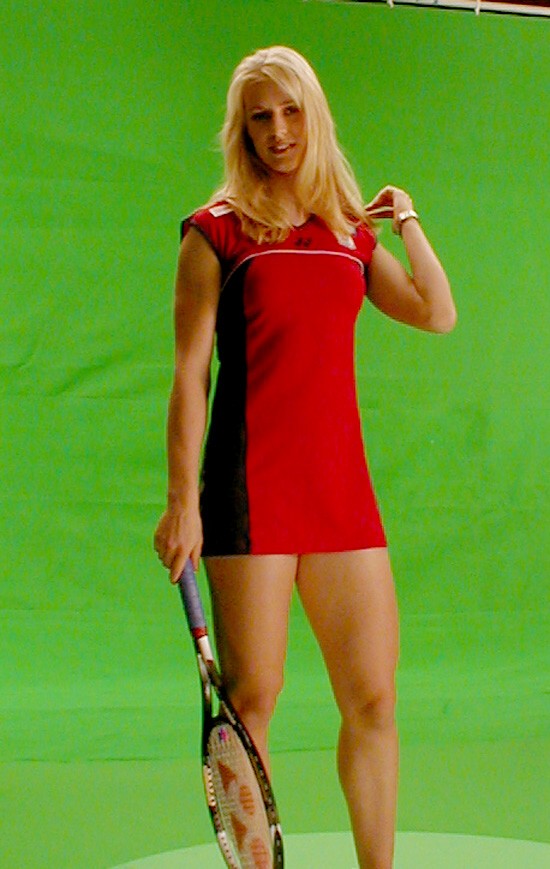 Elena Dementieva
Elena Dementieva
Billie Jean King née Moffitt; born November 22, 1943 in Long Beach, California is a former professional tennis player from the United States. She won 12 Grand Slam singles titles, 16 Grand Slam women's doubles titles, and 11 Grand Slam mixed doubles titles. King has been an advocate against sexism in sports and society. She is known for "The Battle of the Sexes" in 1973, in which she defeated Bobby Riggs, a former Wimbledon men's singles champion.King is the founder of the Women's Tennis Association, the Women's Sports Foundation, and World Team Tennis, which she founded with her former husband, Lawrence King.Contents * 1 Personal life * 2 Tennis career o 2.1 Playing style and personality o 2.2 The early years: 1959 through 1965 + 2.2.1 1959 + 2.2.2 1960 + 2.2.3 1961 + 2.2.4 1962 + 2.2.5 1963 + 2.2.6 1964 + 2.2.7 1965 o 2.3 Prime competitive years: 1966 through 1975 + 2.3.1 Overview of these years + 2.3.2 1966 + 2.3.3 1967 + 2.3.4 1968 + 2.3.5 1969 + 2.3.6 1970 + 2.3.7 1971 + 2.3.8 1972 + 2.3.9 1973 # 2.3.9.1 Battle of the Sexes + 2.3.10 1974 + 2.3.11 1975 o 2.4 The later years: 1976 through 1990 + 2.4.1 1976 + 2.4.2 1977 + 2.4.3 1978 + 2.4.4 1979 + 2.4.5 1980 + 2.4.6 1982 + 2.4.7 1983 + 2.4.8 1984–1990 o 2.5 Furthering the tennis profession o 2.6 Coach of national teams o 2.7 Grand Slam singles tournaments o 2.8 Singles titles and career prize money o 2.9 Major international team competitions + 2.9.1 Federation Cup + 2.9.2 Wightman Cup * 3 Awards, honors, and tributes * 4 Career statistics * 5 Grand Slam singles finals o 5.1 18 finals (12 titles, 6 runner-ups) o 5.2 Records * 6 Footnotes * 7 General references * 8 Further reading * 9 External link Personal lifeBillie Jean Moffitt was born into a conservative Methodist family, the daughter of a fireman father and housewife mother. Her younger brother Randy Moffitt grew up to become a professional baseball player, pitching for 12 years in the major leagues for the San Francisco Giants, Houston Astros, and Toronto Blue Jays.Billie Jean attended Long Beach Polytechnic High School. After graduating, she attended California State University, Los Angeles (CSULA) because her parents could not afford Stanford or the University of Southern California (USC). on September 17, 1965. In 1971, she had an abortion, revealed to the public in a Ms. Magazine article in 1972 by Lawrence without consulting Billie Jean in advance.[8] King said in her 1982 autobiography that she decided to have an abortion because she believed her marriage was not solid enough to bring a child into her family. Billie Jean and Lawrence divorced in 1987.By 1968, King realized that she was interested in women, and in 1971, King began an intimate relationship with her secretary, Marilyn Barnett. King acknowledged the relationship when it became public in a May 1981 "palimony" lawsuit filed by Barnett, making King the first prominent professional female athlete to come out as a lesbian.[ King said that she had wanted to retire from competitive tennis in 1981 but could not afford to because of the lawsuit. "Within 24 hours [of the lawsuit being filed], I lost all my endorsements; I lost everything. I lost $2 million [$4,829,662 in current dollar terms] at least, because I had longtime contracts. I had to play just to pay for the lawyers. In three months I went through $500,000 [$1,207,416 in current dollar terms]. I was in shock. I didn't make $2 million in my lifetime, so it's all relative to what you make." King said in 1998 that Martina Navratilova was not supportive when King was outed, resulting in their relationship having a "very bad five years." about the lawsuit in 2007, 26 years after it was filed, King said:“ It was very hard on me because I was outed and I think you have to do it in your own time. Fifty per cent of gay people know who they are by the age of 13. I was in the other 50%. I would never have married Larry if I’d known. I would never have done that to him. I was totally in love with Larry when I was 21. ”Concerning the personal cost of concealing her sexuality for so many years, King said:“ I wanted to tell the truth but my parents were homophobic and I was in the closet. As well as that, I had people tell me that if I talked about what I was going through, it would be the end of the women's tour. I couldn't get a closet deep enough. I've got a homophobic family, a tour that will die if I come out, the world is homophobic and, yeah, I was homophobic. If you speak with gays, bisexuals, lesbians and transgenders, you will find a lot of homophobia because of the way we all grew up. One of my big goals was always to be honest with my parents and I couldn't be for a long time. I tried to bring up the subject but felt I couldn't. My mother would say, "We’re not talking about things like that", and I was pretty easily stopped because I was reluctant anyway. I ended up with an eating disorder that came from trying to numb myself from my feelings. I needed to surrender far sooner than I did. At the age of 51, I was finally able to talk about it properly with my parents and no longer did I have to measure my words with them. That was a turning point for me as it meant I didn't have regrets any more. Billy Jean King
Billy Jean King Billy Jean King
Billy Jean King Billy Jean King
Billy Jean King Billy Jean King
Billy Jean King Billy Jean King
Billy Jean King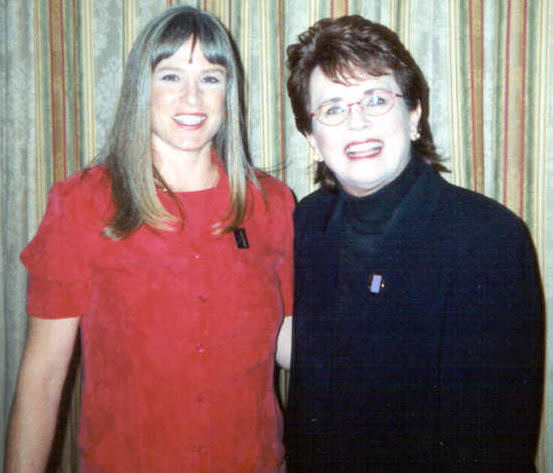 Billy Jean King
Billy Jean King Billy Jean King
Billy Jean King Billy Jean King
Billy Jean King Billy Jean King
Billy Jean King Billy Jean King
Billy Jean King Billy Jean King
Billy Jean King Billy Jean King
Billy Jean King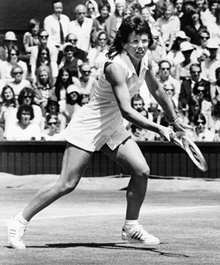 Billy Jean King
Billy Jean King
 Djibril Cisse
Djibril Cisse Djibril Cisse
Djibril Cisse Djibril Cisse
Djibril Cisse Djibril Cisse
Djibril Cisse Djibril Cisse
Djibril Cisse Djibril Cisse
Djibril Cisse Djibril Cisse
Djibril Cisse























 Elena Dementieva
Elena Dementieva




















